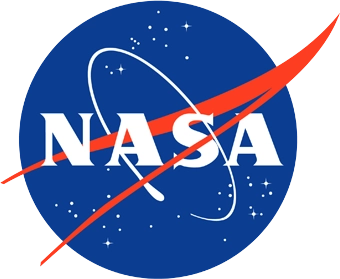Early Career Scientist Spotlight
Dr. Alexander Michels (he/him)
Computational Geophysicist
Planetary Magnetospheres Laboratory (695)
What inspired you to pursue a career in geology/geophysics?
It was a mix of things. I always enjoyed hunting for Petoskey stones on the beach of Lake Huron while camping as a kid. Seeing movies like Twister and Dante’s Peak got me interested in the Earth processes that create natural hazards and made me aware of the job possibilities that would provide the opportunity to study these processes. This led to reading and learning about the solar system, the universe, and the physical sciences. Upon finishing high school, the job market seemed to be better for geology than astronomy, so that is the field of study I chose. It wasn’t until later in my undergraduate degree that I became more aware of the possibility of combining the two, though it wasn’t until my PhD that I was able to do that, with a project looking at magnetic anomalies on Mars. That project led me to my current position.
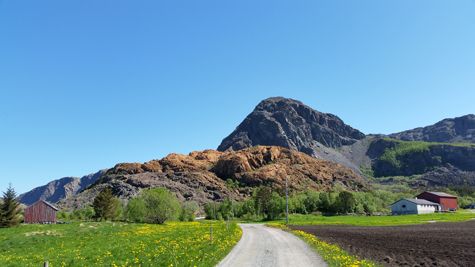
Credit: Alexander Michels
What is one of your favorite moments in your career so far?
Not sure if I can pick just one moment. If I am counting my PhD work as part of my career, then doing field work at my research site is one of my favorites. It was the first time I felt like I was in charge and responsible for my work. For my research site, I studied the Leka Ophiolite Complex off the coast of central Norway. An ophiolite is essentially a piece of oceanic crust and mantle rock that has been uplifted and deposited onto the surface. These objects provide a chance to study unique rocks and mineralogy that would otherwise be inaccessible. It was interesting to do my first field study on my own run and on my own schedule. It was summer in Norway, which has 24 hours of daylight, so I was walking with a magnetometer at 3 in the morning (though that was due more to battery charging issues). It was interesting seeing people give me odd looks as they would drive by, and some stopped to wonder what I was doing with the weird thing on my back (Picture 2, but the magnetometer is on a colleague).
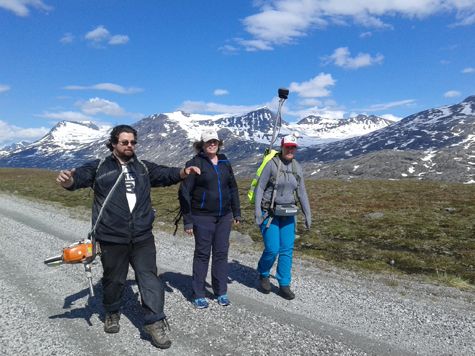
Credit: Dr. Zeudia Pastore
What was your first big research achievement?
My first big research achievement was when I followed my intuition and proved myself wrong. I went and took samples from around 20 different sites around the island of Leka. I analyzed them and did a full paleomagnetic study. I had a definite result. This was how it was, everything seemed to make sense, but the conclusion was not solid enough. So, I went back and got more samples. I did the same analyses again, only the results from the second field excursion disproved, or more accurately muddied, the results of the first study. With no definite answers, I went back two more times to get more samples, which confirmed the first conclusions were wrong. The results are quite interesting, and I look forward to publishing them! Had I never gone back to the field site, I may never have found out what I did and ultimately could have published something that was incorrect, instead of the cool results I actually found.
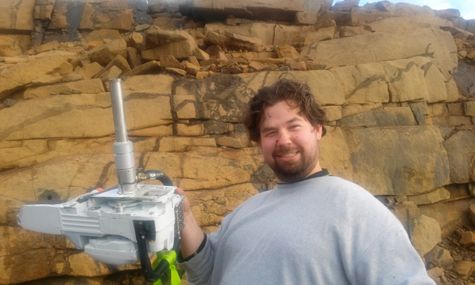
Credit: Dr. Geertje ter Maat
What skills are most useful to you in your work, and where did you develop those skills?
Creative thinking and problem solving are the most useful. It helps to be able to recognize a problem and work out how to possibly solve it, and then to implement solutions to try to fix the problem. Sometimes the problem can be straight forward, while other times the issue may require some creative thinking. I don’t think there is any one place where I learned how to do this; it is just the result of living a life of being encouraged to suggest ideas and try things out. When I was a kid, I would help my dad with projects in the garage, and I was able to ask questions and make suggestions, which would be met with positive feedback about “why something could not be done that way”, “we are doing it this way because…” or “sounds good, let’s try that.” That kind of environment fosters those skills, and I simply carried those skills through the rest of my life.
I would say my creative thinking was also developed in reading fantasy and science fiction books, as well as watching movies and television shows in that genre. I also should give some credit to playing video games and running Dungeon and Dragons for many years in college.
Late in college, I started learning about programming in Python, which does need problem solving and creative thinking, in order to use it for geographic information systems (GIS) applications. This never really panned out until I started my PhD in Norway when I used Python for creating plots of data. I continued in Python for plots and then processing data. Now, I am using it to read data from instruments.
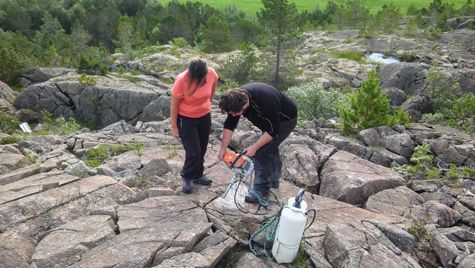
Credit: Dr. Geertje ter Maat
What is a fun fact about you?
I have lived on more continents and countries (4) than I have lived in separate US states (2). I grew up in Michigan and did most of my college education there, and I now live in Maryland. In high school, I was an exchange student to Australia where I lived for 6 months. During my master’s work, I was in a program to serve in the Peace Corps, where I spent 7 months in Madagascar. Most recently, for my PhD, I lived in Norway for 5 years. Within that context, I have never visited a continent short-term apart from North America.
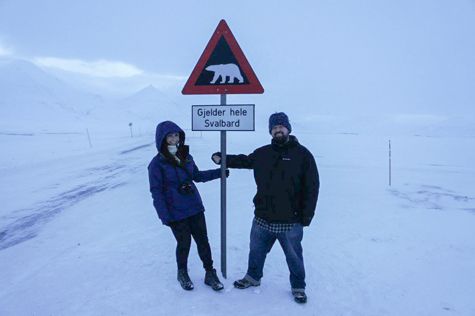
Credit: Bus tourist
What do you like to do in your free time?
I have a wide range of hobbies, that include playing video games, Dungeons and Dragons (and other tabletop roleplaying games), and making things. I have always been interested in stories and storytelling, so any way to enjoy that is something that interests me, and playing video games or playing Dungeons and Dragons allows for the opportunity to enjoy stories on a whole new level.
For making things, I have no chosen particular medium; I like to try new activities and see what I can accomplish each month. Most recently, I have been making large d20s (dice with 20 sides used in role playing games), but in the past few years I have dabbled in wood turning, furniture building, oil pastels, paint pouring, resin casting, and laser engraving/cutting.
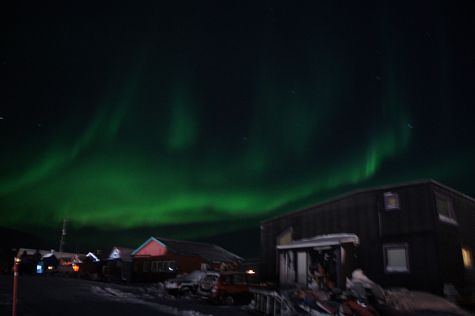
Credit: Alexander Michels
Did you always know that you wanted to be a computational geophysicist?
Definitely not. My mother would tell you that when I was young, I really wanted to be a crossing guard, though I have no recollection to back that up. I do know that in grade school I was very impressionable and seemed to follow my favorite shows or movies. So when Twister and Dante’s Peak came out, I wanted to chase tornados and become a volcanologist. At one point I wanted to study the paranormal as an FBI agent because of the X-files. So, I flip-flopped my career choices growing up. In college I never really got the idea to do what I am currently doing. I thought I would end up in oil or mining as that was where the jobs supposedly were. Even now, I still am not sure if this is what I will always do, as we never know how the wind will blow and take us to the next waypoint in our lives.
Biography
Home Town:
Utica, Michigan
Undergraduate Degree:
B.S. in Geology, Michigan Technological University, Houghton, Michigan
Post-graduate Degrees:
M.S. in Geophysics, Michigan Technological University, Houghton, Michigan
Ph.D. in Geophysics, Norwegian University of Science and Technology, Trondheim, Norway
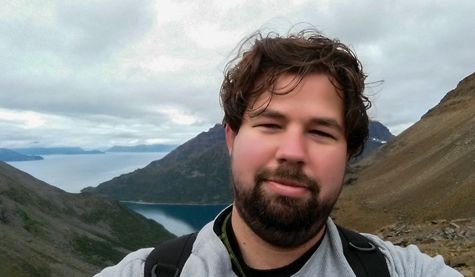
Link to Dr. Michels's GSFC Bio
